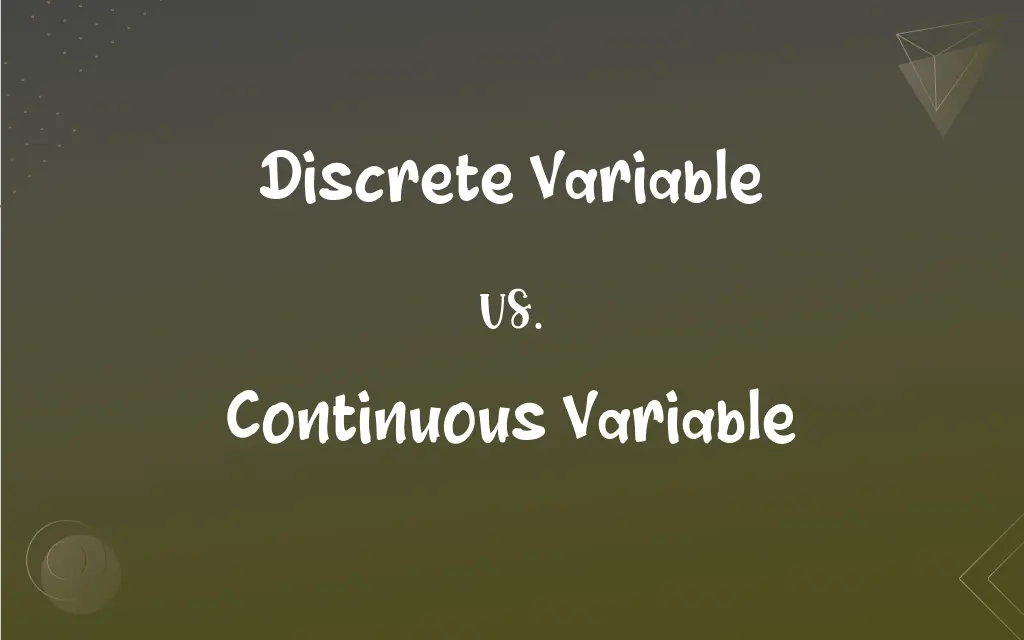Discrete Variable vs. Continuous Variable: What's the Difference?
Edited by Aimie Carlson || By Harlon Moss || Published on November 13, 2023
A discrete variable has distinct, separate values, while a continuous variable can take on an infinite number of values within a range.

Key Differences
A discrete variable is characterized by specific, individual values that are countable. In contrast, a continuous variable represents quantities that can vary continuously, spanning a potentially infinite range of values.
For instance, the number of cars in a parking lot is a discrete variable because you can count each car. Conversely, the weight of a person is a continuous variable as it can lie anywhere within a range, say between 50 kg and 100 kg.
Discrete variables usually arise in scenarios where the outcomes are obtained by counting. On the other hand, continuous variables are typically found in situations where measurements produce a vast array of potential results.
In the realm of statistics and data analysis, understanding the distinction between a discrete variable and a continuous variable is crucial. This is because the type of variable can determine the kind of statistical tests to be employed.
Another notable point is that while discrete variables have a finite or countably infinite number of possibilities, continuous variables have uncountably infinite possibilities, making them impossible to enumerate one by one.
ADVERTISEMENT
Comparison Chart
Nature
Specific, individual values
Varies continuously across a range
Origin
Counting
Measuring
Number of Possible Values
Finite or countably infinite
Uncountably infinite
Examples
Number of books, shoes in a pair
Weight, height, time
In Statistics
Analyzed using specific tests
Requires different analytical methods
ADVERTISEMENT
Discrete Variable and Continuous Variable Definitions
Discrete Variable
Doesn't vary smoothly over a range.
The number of books on a shelf is a discrete variable.
Continuous Variable
Results from measurement processes.
A person's height is a continuous variable.
Discrete Variable
Has distinct, separate values.
The roll number of a student is a discrete variable.
Continuous Variable
Doesn't have distinct, separate values.
The time taken to run a mile is a continuous variable.
Discrete Variable
Originates from scenarios that involve counting.
The number of apples in a basket is a discrete variable.
Continuous Variable
Holds uncountably infinite possibilities.
The amount of milk in a jug is a continuous variable.
Discrete Variable
Represents countable outcomes.
The number of students in a class is a discrete variable.
Continuous Variable
Varies smoothly across an interval.
The speed of a car on a highway is a continuous variable.
Discrete Variable
Possesses finite or countably infinite possibilities.
The number of pets a person owns is a discrete variable.
Continuous Variable
Can assume infinite values within a given range.
The temperature throughout the day is a continuous variable.
FAQs
Can a discrete variable take decimal values?
Yes, a discrete variable can have decimal values if they represent countable outcomes.
Are all measurements considered continuous variables?
Typically, measurements that can vary smoothly across a range are considered continuous variables.
Are continuous variables always numerical?
Continuous variables are typically numerical as they represent quantities that can vary within a range.
How does the nature of a variable affect statistical analysis?
The type of variable determines the statistical tests and methods to use.
What's an example of a discrete variable in finance?
The number of shares owned by an individual is a discrete variable.
Is the number of web page views a discrete or continuous variable?
It's a discrete variable since page views can be counted.
How are discrete variables typically represented in data?
Discrete variables can be listed as distinct values, often in whole numbers.
What is a discrete variable?
A discrete variable represents distinct, countable values.
What defines a continuous variable?
A continuous variable can take on an infinite number of values within a specific range.
Can age be considered a continuous variable?
Yes, age can be a continuous variable if expressed in precise units like years and days, but often it's treated as discrete when rounded to whole numbers.
Can a continuous variable be converted into a discrete one?
Yes, by categorizing or grouping the values, a continuous variable can be made discrete.
What's a real-life example of a continuous variable?
The weight of luggage at an airport check-in is a continuous variable.
Are discrete variables easier to visualize?
Often, yes. Discrete variables can be easily visualized using bar charts, while continuous ones might use histograms.
Are all discrete variables whole numbers?
Not necessarily. While many discrete variables are whole numbers, they can also take on distinct decimal values.
Is blood pressure a discrete or continuous variable?
Blood pressure is a continuous variable as it can vary smoothly across a range.
Why is a person's height a continuous variable?
Height is continuous because it can vary smoothly within a range and take on countless values.
What visualization is best for a continuous variable?
Histograms or line graphs are commonly used to visualize continuous variables.
In which field is the distinction between discrete and continuous variables crucial?
In statistics and data analysis, distinguishing between discrete and continuous variables is vital.
Can the number of people in a city be considered continuous?
No, it's a discrete variable because people can be counted.
Is salary a discrete or continuous variable?
Though salaries are often rounded and treated as discrete, they can be considered continuous as they can vary within a range.
About Author
Written by
Harlon MossHarlon is a seasoned quality moderator and accomplished content writer for Difference Wiki. An alumnus of the prestigious University of California, he earned his degree in Computer Science. Leveraging his academic background, Harlon brings a meticulous and informed perspective to his work, ensuring content accuracy and excellence.
Edited by
Aimie CarlsonAimie Carlson, holding a master's degree in English literature, is a fervent English language enthusiast. She lends her writing talents to Difference Wiki, a prominent website that specializes in comparisons, offering readers insightful analyses that both captivate and inform.








































































